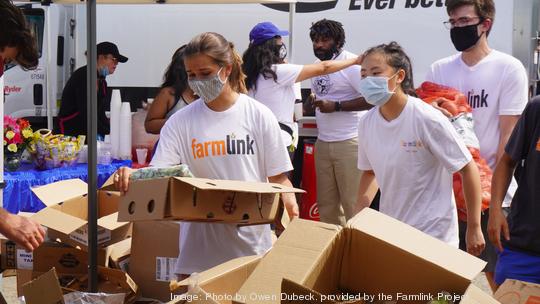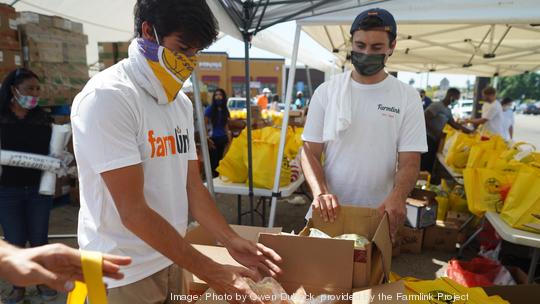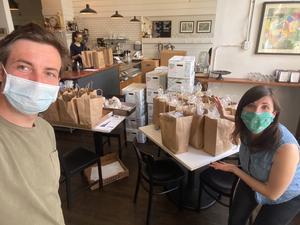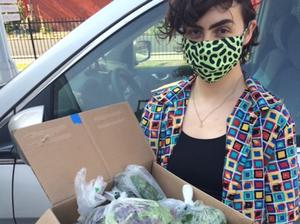
Did you know that 30 to 40 percent of the United States’ food supply immediately goes to waste? That means that every year, America spends about $218 billion cultivating, processing, then throwing away food that is never eaten.
The coronavirus pandemic has only exacerbated the problem, causing excess yields in food supply chains. With restaurants and schools closed or operating at a limited capacity, the demand for food has decreased—and farmers have resorted to destroying their agricultural products.
This problem hasn’t gone unnoticed. One nonprofit startup, the Farmlink Project, has stepped up with a solution, rescuing and transporting about 13 million pounds of food since April.
“We get in touch with farms and form relationships, acquire surplus produce like dairy and eggs and transport it to different communities, food banks and demand centers around the United States,” said co-founder William Collier.
The Farmlink Project is comprised of students from 50 colleges and universities across the country, including Harvard University, MIT, Babson College, Brown University, Georgetown University and more. It was founded by William and Ben Collier (twins), Aidan and Emmett Reilly (twins), James Kanoff, Chad Kanoff, Max Goldman, Jordan Hartzell, Stella Delp and AJ Wheeler. Technically headquartered in Los Angeles, the project is as geographically dispersed as its team is.
The founders started the company after reading numerous articles on the pandemic’s effects on food supply chains.
“We kept seeing articles about farms facing massive surpluses as a result of the shutdown of the commercial food industry,” Ben Collier said. “At the same time, we read articles about food banks facing the largest demand they'd seen in decades, all because of Covid. We thought that, in a way, those two problems solve each other. One place has too much food, and one place doesn't have enough.”
With their college campuses closed in the spring because of Covid-19, the founders decided to start cold-calling farms that might have surplus yields or unmarketable produce. If the farmers they contacted didn’t have excess produce, the team would instead ask how they could encourage other farmers to work with the Farmlink Project. The nonprofit incentivizes farmers to participate by giving each farmer tax write-offs, which it pays for through donations.
“One hundred percent of all individual donations goes towards moving food from point A to point B, acquiring the surplus and getting it to the communities that need it,” William Collier said. “So that's the pick and pack-out costs, paying the farmers and then getting it to the food banks.”
The startup decides which farms and food banks to contact through community “power hours” conducted by its Farms team. During these power hours, the Farms team and external volunteers meet through Zoom and research different farms that are experiencing food surpluses. Once the team decides which farms to work with, its members collaborate with the Food Placement team. From there, the Food Placement team goes through a network of food banks and communities in need and connects with the best fit.
“Once we know where the food is we start looking in that area for communities that we've built relationships with that we're trying to support, and we connect the dots,” said Ben Collier, a student at Brown.
To transport the produce, the Farmlink Project has a partnership with Uber Freight, an app from Uber that connects carriers and shippers. The nonprofit’s larger deals can consist of up to 40,000 pounds of food. Uber Freight has provided hundreds of trucks to transport those shipments over the last several months.
For smaller deals, the Farmlink Project tries to connect the farm with a local food bank or community group where the farmer can either drop it off for the food bank or the food bank can pick it up.
Besides Uber Freight, the company also has relationships with Food Rescue Network, Food Rescue US, Borden Dairy, Taylor Farms, IDEO, World Wildlife Fund and Kroger. The company’s current fiscal sponsor is Food Finders, LLC, which provided the Farmlink Project with its 501(c)3 nonprofit status.

By rescuing food and giving it to people in need, the Farmlink Project is also positively impacting the environment, William Collier said.
“We've been able to prevent over 15 million pounds of carbon emissions from entering the atmosphere just by getting food to people instead of having it rot in fields or create carbon in a landfill somewhere,” he said.
The Farmlink Project is tackling food waste and its effects on the environment during a global pandemic, and the majority of its members are still in school. So what comes next?
William Collier, who recently graduated from Brown, said the Farmlink Project would continue after the coronavirus outbreak. Besides being an immediate means to fix food waste in temporarily broken supply chains, the company wants to be a long-term solution to the systemic problem of food waste—not “just another Band-Aid,” he said.
Cooper Adams, a student at Georgetown University and head of the Farms team, agrees.
“Change needs to occur in the way we think about the definition of progress underlying the food system,” Adams said. “Investments and research should be focused on how to make food accessible for all, rather than how to make it most economically profitable. This takes a change in mindset from being profit-driven to prioritizing the wellbeing of all people, which in the long-run, will lead to things such as a stronger and more resilient economy, healthier population and less money spent on services like health care."
Emma Campbell is a contributing writer for BostInno and Rhode Island Inno.






